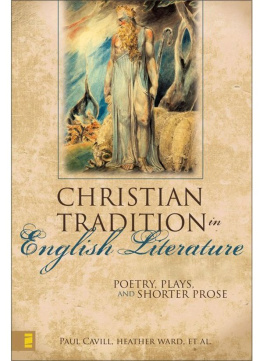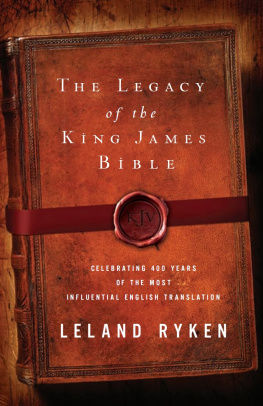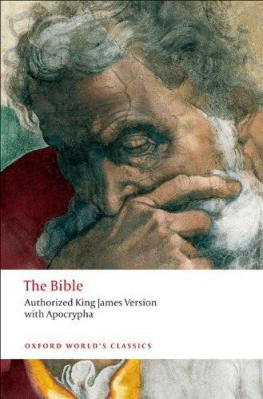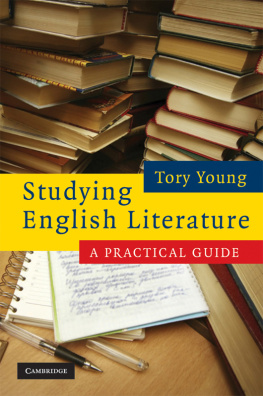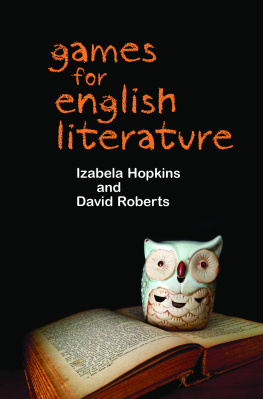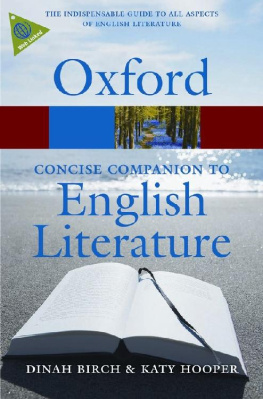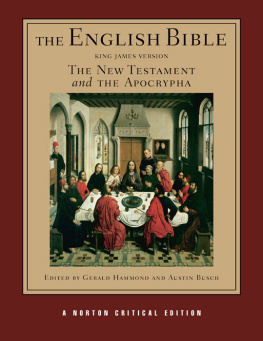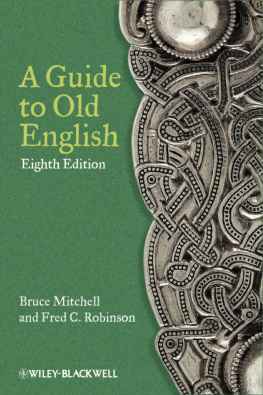ZONDERVAN
THE CHRISTIAN TRADITION in English Literature
Copyright 2007 by Paul Cavill and Heather Ward
All rights reserved under International and Pan-American Copyright Conventions. By payment of the required fees, you have been granted the non-exclusive, non-transferable right to access and read the text of this e-book on-screen.No part of this text may be reproduced, transmitted, down-loaded, decompiled, reverse engineered, or stored in or introduced into any information storage and retrieval system, in any form or by any means, whether electronic or mechanical, now known or hereinafter invented, without the express written permission of Zondervan.
ePub Edition June 2009 ISBN: 0-310-86135-7
Requests for information should be addressed to:
Zondervan, Grand Rapids, Michigan 49530
Library of Congress Cataloging-in-Publication Data
Cavill, Paul, 1956
The Christian tradition in English literature : poetry, plays, and shorter prose / Paul Cavill and Heather Ward with Matthew Baynham and Andrew Swinford and contributions from John Flood and Roger Pooley.
p. cm.
Includes bibliographical references.
ISBN-13: 978-0-310-25515-4
1. English literature History and criticism. 2. CHRISTIANITY and literature EnglandHistory. 3. Christian literature, English History and criticism. 4. Religion and literature. 5. Bible In literature. I. Ward, Heather, 1951 II. Baynham, Matthew. III. Swinford, Andrew. IV. Flood, John. V. Pooley, Roger. VI. Title.
PR145.C38 2007
820.9'3823 dc22
2006037571
This book refers to the Bible in the King James, or Authorized, Version except where otherwise noted. There are two reasons for this. First, it is the English translation that is most influential and widely known from the seventeenth century to the present day, a popularity merited by its accuracy and literary qualities. Second, the work preserves a great deal of the best English translation and scholarship from earlier generations (see the essay The Bible and Prayer Book in section 2). Thus, the KJV often represents the understanding and even the language of the Bible not only of the seventeenth and later centuries, but also of the earlier centuries back into the medieval period.
Readers unfamiliar with the Bible or coming to it for the first time will perhaps find that the KJV presents difficulties: some words have changed meaning, and we no longer use the pronouns thou and ye, or the singular present-tense verb-forms hath, doth, or saith in everyday discourse. For this reason, we recommend that newcomers to the Bible select a modern rendering such as the New International Version (NIV), where these linguistic forms do not impair the accessibility of the Bible message.
All rights reserved. No part of this publication may be reproduced, stored in a retrieval system, or transmitted in any form or by any means electronic, mechanical, photocopy, recording, or any other except for brief quotations in printed reviews, without the prior permission of the publisher.
07 08 09 10 11 12 15 14 13 12 11 10 9 8 7 6 5 4 3 2 1
Information about External Hyperlinks in this ebook
Please note that footnotes in this ebook may contain hyperlinks to external websites as part of bibliographic citations. These hyperlinks have not been activated by the publisher, who cannot verify the accuracy of these links beyond the date of publication.
To Doug Gallaher without whom...
C ONTENTS
SECTION 1:
THE MEDIEVAL PERIOD
7 | The Medieval Beast Fable: Marie de France, Geoffrey Chaucers The Nuns
Priests Tale, and Robert Henrysons The Cock and the Fox
SECTION 2:
RENAISSANCE, REFORMATION,
AND REPUBLIC
SECTION 3:
THE RESTORATION AND THE
EIGHTEENTH CENTURY
SECTION 4:
THE ROMANTICS AND VICTORIANS
SECTION 5:
THE TWENTIETH CENTURY
SECTION 6:
THE CHRISTIAN TRADITION
SECTION 7:
GLOSSARY
This book is about the Christian aspects of English literature, from the Anglo-Saxons to the writers of the twentieth century. The need for such a book will be obvious to many, both those with a professional interest and those who care about understanding what they read. The Christian tradition in English literature is becoming the province of a few specialists, a minority interest. The simple fact is that teachers of literature regularly find that students have little or no knowledge of the Bible and its basic story line, its concepts and images, its characters and themes. Many teachers themselves will admit to lacking this knowledge. Indeed, when it comes to some aspects of the Christian tradition say, the points debated between Calvinism and Arminianism or the ideas associated with scholasticism even specialists may struggle. The result is that important Christian aspects of literature are often misunderstood and sometimes even misrepresented.
This book has been written for todays students, teachers, and readers. It aims at giving a sense of the importance and continuity of the Christian tradition in English literature; a sense of a coherent belief-system being expressed in very different ways; a sense of the validity and power of the Christian worldview over the centuries. It has been written in the belief that this is not only worthwhile from a pedagogical point of view, but also that it will aid enjoyment of literature. We have felt delight and relief ourselves, and often experienced it in others, when some puzzling passage or allusion has been explained. Our aim, then, is to help readers to read in an informed and intelligent fashion, and for them to be able to discuss the Christian aspects of literature with confidence.
Another important aim for the writers of this book was to engage in and model responsive and responsible literary criticism. We believe that criticism should respond to texts in their literary, linguistic, and social context and that the critics primary role is to understand and then to communicate understanding. This has not always been a popular view in recent years. We recognise some dangers in privileging the Christian grand narrative, and indeed the literary-critical metanarrative, but the greater danger seems to us to reside in ignoring these when they so clearly inform the texts. We are dealing with a tradition, understandings and assumptions about the world passed on from generation to generation, adopted, rejected, questioned, and adjusted but not lost. Ours is perhaps the first generation in over a millennium in which the Christian tradition is for some readers of English literature terra incognita, uncharted territory.
The book gives brief and informative essays on the Christian background to the texts and the way the texts interact with the Christian tradition. The aim is to inform and stimulate rather than to be exhaustive or confrontational. There is no single definitive approach: the language, the allusions, the structure, the characters, the style, the moral architecture, the themes, the social issues, the biblical framework, the intellectual basis of the texts may all feature in the discussion. Although the approach is often expository, we aim to leave room for discussion, disagreement, and open-ended debate. We express our opinions and views, relating them to the texts under discussion, but recognise that other readers might respond differently.
We hope this book will enable readers to enjoy and understand English literature more fully. We acknowledge that we have barely scratched the surface of the Christian tradition or English literature, but we hope that we have given enticing glimpses of the riches and the pleasure that are to be found by those who delve more deeply.

